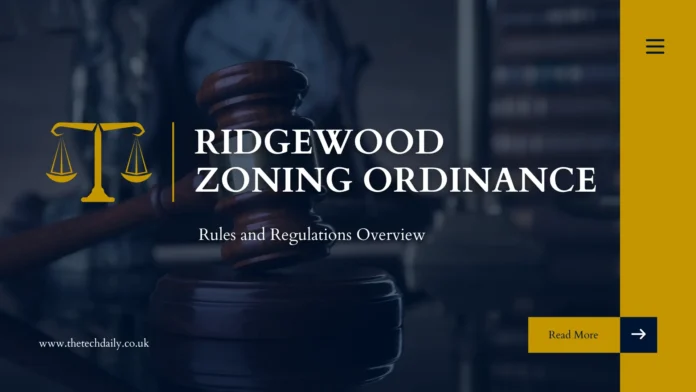In the case of the Village of Ridgewood Zoning Ordinance in New Jersey, the zoning ordinance determines how land and property might be used and is of vital importance. Be it a new construction, a renovation project by a homeowner, a new business location by a business owner, or a development project by a developer, all have to comply with the zoning regulations in Ridgewood. This guide is aimed at helping you confidently navigate zoning regulations in Ridgewood by breaking down the ordinance step by step.
What Is The Ridgewood Zoning Ordinance
As with any other municipality, the zoning ordinance in Ridgewood consists of local laws governing land use, the nature and dimensions of buildings, the size of lots, setbacks, and activities permitted within zoning districts. It attempts to manage development in regards to property value, community character, and safety.
The Village Council adopts the regulations while the Building Department and Zoning Board of Adjustment enforce them. Ridgewood is divided into various zoning districts with different development and land use regulations.
Objectives of the Zoning Ordinance
Here are the primary objectives of the zone regulations of Ridgewood:
- Preserving Neighborhood Character: Ensuring new development is in scale and architectural style compatible with the existing buildings.
- Managing Growth: Directing areas where living spaces, commerce, and industrial activities can be developed.
- Protecting Property Values: Curbing incompatible uses that may have detrimental effects on adjacent properties.
- Enhancing Safety: Overcrowding and other hazards are mitigated by controlling the altitude, setback, and density of buildings.
- Supporting Economic Vitality: Balanced and planned business districts serve the population as well as tourists.
Zoning Districts in Ridgewood
The village of Ridgewood has been zoned into districts with specific regulations for each as per the Ridgewood Zoning Ordinance. Some district categories are as follows:
Residential Zones
These zones are mainly for Single-family houses, Duplexes, and sometimes, townhouses. The regulations generally include the following:
- Minimum lot size
- Maximum building height
- Setback from the property lines
- Limits on accessory structures like sheds and garages
Commercial Zones
These zones are meant for retail shops as well as offices and service-based businesses. The district may have:
- Signage policies
- Parking space requirements
- Restrained building limit and placement
- Certain businesses may be restricted
Mixed-Use Zones
Inhabitants and visitors may use residential and commercial districts interchangeably. This is largely seen in the downtown regions which are meant to be pedestrian friendly and full of activity.
Industrial Zones
These areas are meant for activities such as manufacturing and warehousing. These regions are generally more rigid on environmental regulation and safety compliance.
Essential Guidelines
In Ridgewood, you’ll need to comply with Ridgewood Zoning Ordinance if you intend to change any property feature. Here are the most notable ones:
Setbacks
Setbacks are defined as the distance between the structure and the property line. It allows sufficient distance for light and air and protecting privacy to both the structure and the surrounding buildings.
Building Height Limits
All zoning designations have a defined maximum height in order to control the scale of the neighborhood and avoid overshadowing neighboring properties.
Lot Coverage
The zoning ordinance also control the amount of a property that may be covered with impermeable surfaces to help manage runoff and maintain vegetation and green areas, known as Lot Coverage.
Permitted Uses
Every zoning district contains enumerated right uses; in residential zones, single family housing would be the right use, while retail stores would be permitted in commercial zones.
Special Permits & Variances
For noncompliance with the general zoning guidelines, Special Permits and Variances may be issued by the Zoning Board of Adjustment.
The Zoning Board of Adjustment
Requests for variances and appeals are heard by the Zoning Board of Adjustment (ZBA). The property owners are able to approach the ZBA in cases where:
- They are stuck with the dimensional constraints (setbacks, lot size).
- They hope to start a use that is not normally permitted within their zone.
- On a zoning officer’s decision, they would like to appeal.
The ZBA considers each individual case with regard to their impact upon the community, the degree of hardship placed on the applicant, and whether the request is congruent with the comprehensive plan of the village.
How To Verify Your Zoning Designation
Before beginning any type of development, it is advisable to verify the zoning designation of a property. This is done by:
- Accessing the municipal website of Ridgewood and proceeding to the zoning section.
- Checking the official zoning map and identifying the district.
- Checking the ordinance for specific rules pertaining to your district.
- Calling the Building Department for further inquiries.
Obtaining a Zoning Permit
A zoning permit is required for any new construction, alteration, or use of a parcel of land in Ridgewood. This usually requires:
- Filling out the zoning application available online or at Village Hall.
- Attaching site plans for the intended amendments.
- Paying the required fee.
- Waiting for the zoning officer to check for compliance.
You will receive a permit if your project satisfies all the conditions. Otherwise, it will be necessary to seek a variance.
Frequent Zoning Problems in Ridgewood
Residents in Ridgewood face a variety of issues including:
- Nonconforming Lots: Outdated properties that are unable to meet current size or setback guidelines are termed as nonconforming lots
- Accessory Dwelling Units: Secondary residential units fitted within these older homes may have regulations to be followed.
- Historic Preservation Requirements: Certain regions may need to go under more stringent review to maintain the historic integrity.
- Parking Regulations: Businesses as well as multi-family residences need to adhere to certain minimum parking standards.
Zoning Violation and Enforcement
Additional issues in observing the ridgewood zoning ordinance include:
- Incurring a fine
- Stop work order
- Legal action to rectify the zoning gap
Make sure to reference zoning regulations before starting a project to avoid losing time and incurring additional costs.
Understanding Why the Ordinance is Important
The Ridgewood zoning rules are not only of concern to developers—these rules are equally important for every property owner in the region. Understanding the ordinance enables you to:
- Avoid untimely legal disputes or project delays
- Protect relationships with neighbors
- Protect property value
Final Remarks
The Ridgewood zoning ordinance establishes the parameters through which the community is to develop and how it is to operate. It strives to promote the efficient use of time and costs and mitigate the community’s collective frustration. Regardless of whether you are constructing a home, starting a business, or adding a deck, zoning compliance is key to project success in Ridgewood.
Questions and Answers
Q: What is the Ridgewood zoning ordinance for?
A: To control how land is developed, constructed on, and used to maintain and enhance the character of the community.
Q: Where can I check the zoning of my property in Ridgewood?
A: Visit the village’s website for the zoning map or you may contact the Building Department for help.
Q: What are the consequences of breaching the zoning ordinance?
A: Possible fines, stop-work orders, or legal action are some of the breaches consequences.
Q: Can I request a zoning variance in Ridgewood?
A: If your project deviates from standard regulations, you may apply to the Zoning Board of Adjustment.
Q: Do I need a permit for minor home improvements?
A: It depends on the work you are undertaking. You must confirm with the Building Department to establish permit prerequisites.



